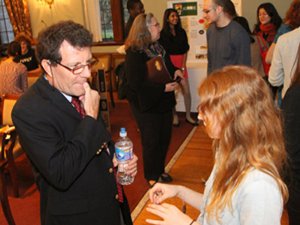NYT Columnist Nicholas Kristof Recalls Being "Startled" by Student Question During His Campus Visit
NYT Columnist Nicholas Kristof Recalls Being
"Startled" by Student Question During His Campus Visit
by Alisa Giardinelli
1/19/12

"I think I must have been a Swattie in a former life," said New York Times columnist Nicholas Kristof to an overflow LPAC crowd during his talk on campus.
When he visited campus a couple months ago, New York Times columnist Nicholas Kristof met with students at War News Radio (listen to their conversation) and at a poster session that featured students' community service projects (pictured left). During his public talk, "A Call to Action," he received enthusiastic applause when he stated: "I think I must have been a Swattie in a former life."
In his most recent column, he recalls his day-long visit, organized by the Lang Center for Civic and Social Responsibility, and notes that he was "startled by one question: Is it immoral for students to seek banking jobs?"
The question in fact arose during an interview by the Daily Gazette's Jon Emont '12, who raised the issue during their conversation. An excerpt follows:
JE: You mention in "Crony Capitalism Comes Home" that bankers are not "evil at all." And this year, like most other years, many Swarthmore graduates will take their first class education and go directly into finance, as analysts at JP Morgan, Goldman Sachs, and many other banks that pay their workers handsomely without contributing much to the public good (and that, arguably, actively undermine it). In part they do so because, as a society, we avoid taking people to task for dedicating their lives to the pursuit of wealth. Would you be willing to say to Swarthmore students, "If you go directly into finance,when there are so many opportunities for smart kids to give back to the world, you are behaving immorally?" If not, why not?
NK: I wouldn't scold anyone for going into finance, and I wouldn't want to demonize bankers. Properly regulated, banking does contribute to the public good - although it's also true that inadequately regulated it manages to socialize risk and privatize profit in ways that leave the public worse off. I also think it's a mistake for progressives to self-select out of certain sectors. For example, liberals to some extent opted out of CIA recruitment for a generation or so after the 1970's, and in retrospect that was probably a mistake: I think the result was an intelligence community that gave more hawkish advice and analysis to policy-makers.
I do hope, though, that Swarthmore grads who go into banking will take principles and ideals with them. That might mean using some of those nice salaries to "give back." It might mean helping provide banking services to the unbanked. And it might simply mean listening a bit more to your conscience when those around you are suggesting dubious shortcuts that just don't feel right. Frankly, the graduates will themselves feel better and more fulfilled if their life goal is more than profit maximization, whether for themselves or for a bank.
In his column, Kristof concludes (with caveats):
"After Vietnam and revelations of C.I.A. abuses in the 1970s, many university students avoided the military and the intelligence agencies. So slots were filled disproportionately by ideological conservatives in a way that undermined everyone's interests. We would have been better off if more Swarthmore idealists had become generals and C.I.A. officers - and we may be better off if some idealists become bankers as well."


